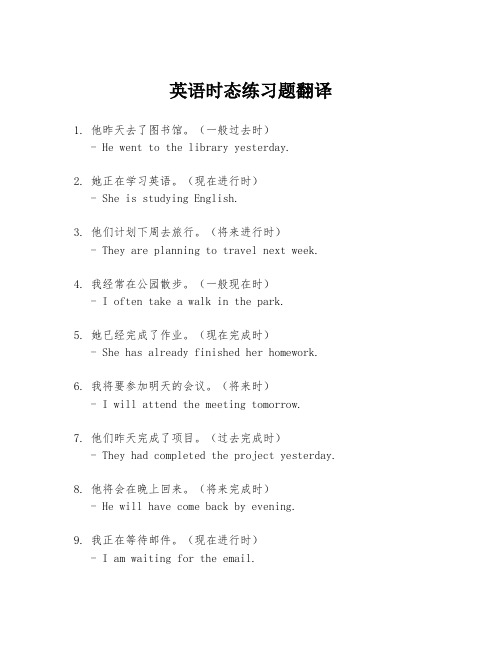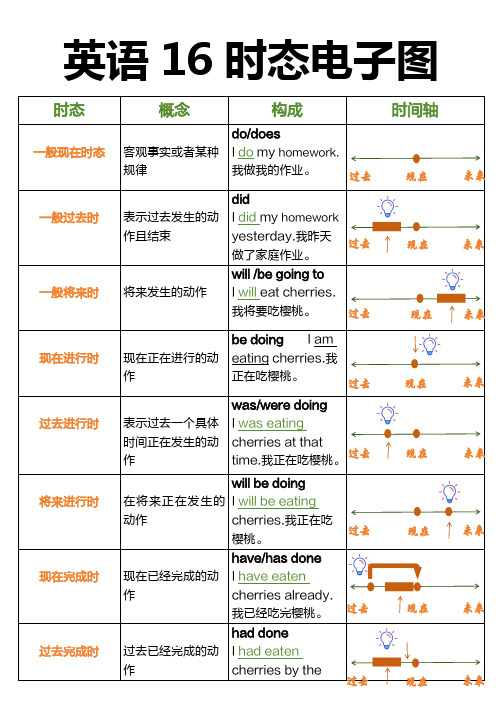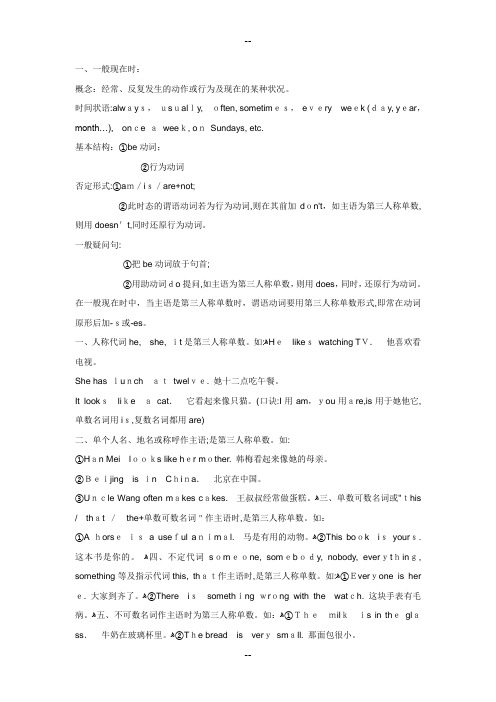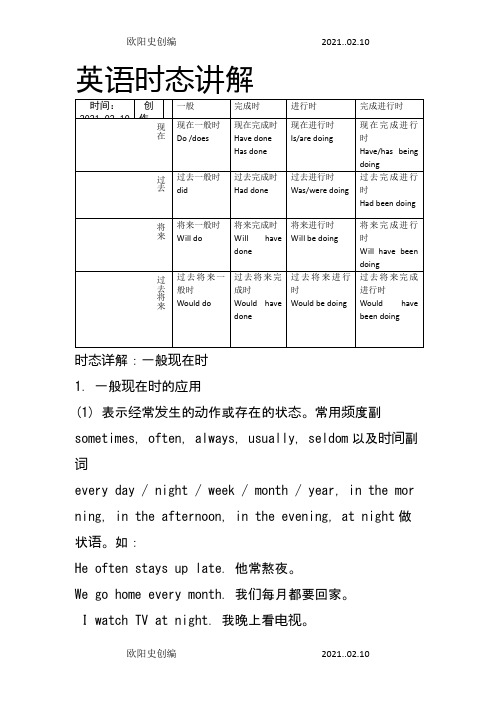英语大时态翻译题图文稿
英语各种时态汉译英

(一般现在时、一般过去时、一般将来时、现在进行时、过去进行时、现在完成时)1.我姐姐每天早上7点起床。
2.上周末Lucy和她的父母去爬了山。
3.我待会就给我妈妈发一条短信。
4.黄金的价格正在升高。
你应该快点去买一些。
5. 我的朋友们去年这个时候正在助人为乐。
6. Kate一家已经去过超过10个国家了。
7. 当你踢球时,你的舅舅把晚饭做好了。
8. 他是不是正在学日语?9.你永远也不会知道这个秘密的。
10. Tom的弟弟弄坏了这个书桌的一条腿。
(一般现在时、一般过去时、一般将来时、现在进行时、过去进行时、现在完成时)1.我昨天去了公园。
2.他的手机马上就要坏了。
3.你可以去和他交谈了,他正在那边吃午饭。
4.在你睡觉的时候,他们静悄悄地打扫了房间。
5.我3岁开始就住在成都了。
6.当他正在看电视时,她正在购物。
7.谁正在教室里唱歌?8.十天之后我们的店就要关闭了。
欢迎你们来买便宜的鞋和包。
9.去年夏天,他们的数学老师结婚了。
10.警察每天下午都会来这条街道。
(一般现在时、一般过去时、一般将来时、现在进行时、过去进行时、现在完成时)1.我们下周就要放假了。
2.爷爷奶奶正在公园里散步。
3.我进门时他正在修电脑。
4.这个学校里每个人自从去年开始就学习上网。
5.我们正在一天天长大,父母正在一天天变老。
6.我下周六要和我妈妈去购物。
我们要买衣服和米。
7.我认为你昨天做了一件正确的事。
8.我从来不去看电影。
9.这电影太差了,没人在认真看。
10. 当我走进电影院时,很多人正在讨论这部电影。
(一般现在时、一般过去时、一般将来时、现在进行时、过去进行时、现在完成时)1.听!鸟儿正在唱歌。
2.他们去年这个时候正在家乡卖水果。
3.他们的奶奶已经去世5年了。
4.我和爷爷每天一起玩国际象棋。
5.他和他爸爸上周末玩了一整天篮球。
6.Sam迟到了。
此刻,他正在路上奔跑。
7.我还没吃过法国食物。
8.他的校服脏了,所以他今天没穿。
9.昨天我来这时,这些男孩正在捉一条蛇。
英语时态练习题翻译

英语时态练习题翻译1. 他昨天去了图书馆。
(一般过去时)- He went to the library yesterday.2. 她正在学习英语。
(现在进行时)- She is studying English.3. 他们计划下周去旅行。
(将来进行时)- They are planning to travel next week.4. 我经常在公园散步。
(一般现在时)- I often take a walk in the park.5. 她已经完成了作业。
(现在完成时)- She has already finished her homework.6. 我将要参加明天的会议。
(将来时)- I will attend the meeting tomorrow.7. 他们昨天完成了项目。
(过去完成时)- They had completed the project yesterday.8. 他将会在晚上回来。
(将来完成时)- He will have come back by evening.9. 我正在等待邮件。
(现在进行时)- I am waiting for the email.10. 他昨天没有来,因为他生病了。
(过去进行时)- He didn't come yesterday because he was sick.11. 她将会在明天之前完成报告。
(将来完成时)- She will have finished the report by tomorrow.12. 他们正在讨论会议的安排。
(现在进行时)- They are discussing the meeting arrangements.13. 我刚刚完成了我的工作。
(现在完成时)- I have just finished my work.14. 他将会在周末之前完成这项工作。
(将来完成时)- He will have completed this work by the weekend.15. 我将要开始学习新的课程。
一般过去时讲解及习题图文稿

一般过去时讲解及习题集团文件发布号:(9816-UATWW-MWUB-WUNN-INNUL-DQQTY-一般过去时1.一般过去时表示过去某个时间发生的动作或存在的状态,常和表示过去的时间状语连用。
一般过去时也表示过去经常或反复发生的动作。
2.Be动词在一般过去时中的变化:⑴am 和is在一般过去时中变为was。
(was not=wasn't)⑵are在一般过去时中变为were。
(were not=weren't)⑶带有was或were的句子,其否定、疑问的变化和is, am, are一样,即否定句在was或were后加not,一般疑问句把was或were调到句首。
3.句中没有be动词的一般过去时的句子否定句:didn't +动词原形,如:Jim went home yesterday.Jim didn't go home yesterday.一般疑问句:在句首加did,句子中的动词过去式变回原形。
如:Jim went home yesterday.Did Jim go home yesterday?特殊疑问句:⑴疑问词+一般疑问句如:Jim went home yesterday.Did Jim go home yesterday?What did Jim do yesterday?动词过去式变化规则:1.一般在动词末尾加-ed,如:pull-pulled, cook-cooked2.结尾是e加d,如:taste-tasted3.末尾是辅音字母加一个元音字母和一个辅音字母的重读闭音节,应双写末尾的辅音字母,再加-ed,如:stop-stopped4.以“辅音字母+y”结尾的,变y为i,再加-ed,如:study-studied5过去时练习写出下列动词的过去式is\am_____________ fly____________ plant____________ are ____________drink_____________ play___________ go______________ make ________does_____________ dance__________ worry___________ ask___________taste_____________ eat____________ draw____________ put ____________throw____________ kick___________ pass____________ do__________Be动词的过去时练习(1)一、用be动词的适当形式填空1.I _______ at school just now.2.He ________ at the camp last week.3.We ________ students two years ago.4.They ________ on the farm a moment ago.5.Yang Ling ________ eleven years old last year. 6.There ________ an apple on the plate yesterday. 7.There ________ some milk in the fridge on Sunday. 8.The mobile phone _______ on the sofa yesterday evening.二、句型转换1. It was exciting.否定句:________________________________________________一般疑问句:____________________________________________肯、否定回答:__________________________________________2. All the students were very excited.否定句:________________________________________________一般疑问句:____________________________________________肯、否定回答:__________________________________________3. They were in his pocket.否定句:________________________________________________一般疑问句:____________________________________________肯、否定回答:__________________________________________Be动词的过去时练习(2)一、用be动词的适当形式填空1.I ______ an English teacher now.2.She _______ happy yesterday.3.They _______ glad to see each other last month.4.Helen and Nancy ________ good friends.5.The little dog _______ two years old this year.6.Look, there ________ lots of grapes here.7.There ________ a sign on the chair on Monday..8.Today _______ the second of June. Yesterday ______ the first of June. It _____ Children's Day. All the students ______ very excited.二、句型转换1. There was a car in front of the house just now.否定句:________________________________________________一般疑问句:____________________________________________肯、否定回答:__________________________________________肯、否定回答:__________________________________________三、中译英1. 我的故事书刚才还在手表旁边。
(word完整版)初中英语时态讲解及练习(含答案),推荐文档

时态1. 一般现在时●形式:do does(单数第三人称)●意义:一般现在时表示客观的、普遍性的真理以及经常性的事件。
●用法:A) 表示现在发生的动作、情况、状态和特征。
B) 经常性、习惯性动作。
e.g.:He always helps others. (他总是帮助别人。
)He often goes to the gym.C) 客观事实和普遍真理。
尤其要注意,如果前后文不是一般现在时,则无法保持主句、从句时态一致。
e.g.: The sun rises in the east and sets in the west.Knowledge is power.●这一用法场合一些表动作频率的时间副词连用:1). 表示肯定的频率副词:always, frequently, usually, sometimes, generally, occasionally, often etc.2). 表示否定的频率副词:never, seldom, rarely etc.➢这些副词的位置:在Be动词后,实义动词前。
e.g. He is always late.2. 一般过去时●形式:did●意义:一般过去时表示在过去的某一特定时间发生和结束的活动或情况。
●用法:A) 表示过去某个时间发生的动作或情况。
e.g.: I saw him in the library yesterday morning. (有特定的时间状语)➢yesterday, yesterday evening, last night/month/spring/year, the night before last(前天晚上),three days/months/years ago, in 1999 etc.。
这些时间状语之前不用加介词。
B) 表示过去习惯性动作,一直持续或反复发生的动作,此时可与表示拼读的时间副词连用。
e.g.: I slept for eight hours last night. (表示在过去某一段时间内持续的动作,但这动作现在已经结束了)3. 一般将来时●形式:will/shall do或be going to do●意义:一般将来时表示在未来的某个时间将要发生的某个动作或状态。
时态练习题(带中文翻译)

英语时态练习题一般现在时1中文:--- 你觉得这台上海制造在电视怎样?--- 呃,我不关心这样的事。
一般过去时2.中文:我认识布朗先生。
我们在一次国际会议上见过面。
一般将来时3.中文:这周六如果不下雨,我们就去野餐。
现在进行时4.中文:工人们正在修建一座新桥。
广州的交通很快将得到改善。
过去进行时5.中文:10年前我第一次见到汤姆的时候,他那时在一个录音机工厂工作。
现在完成时6.中文:你打算怎么去上海旅行?------ 还没有决定,但是我在想坐火车去。
过去完成时态7.中文:当李明急匆匆的到家时,他母亲已经被送往医院。
现在完成进行时8.中文:你的报告写完了吗?-----还没有,这一周我都在写。
英语时态练习题一般现在时1中文:--- 你觉得这台上海制造在电视怎样?--- 呃,我不关心这样的事。
一般过去时2.中文:我认识布朗先生。
我们在一次国际会议上见过面。
一般将来时3.中文:这周六如果不下雨,我们就去野餐。
现在进行时4.中文:工人们正在修建一座新桥。
广州的交通很快将得到改善。
过去进行时5.中文:10年前我第一次见到汤姆的时候,他那时在一个录音机工厂工作。
现在完成时6.中文:你打算怎么去上海旅行?------ 还没有决定,但是我在想坐火车去。
过去完成时态7.中文:当李明急匆匆的到家时,他母亲已经被送往医院。
现在完成进行时8.中文:你的报告写完了吗?-----还没有,这一周我都在写。
1 What do you think of this kind of TV set, which is made in Shanghai?--- Well, I don’t care about such things.2 I know Mr. Brown; we met each other at an international conference.3.If it doesn’t this Saturday, we will go for a picnic.4.The workers are a new bridge now. The traffic in Guangzhou will be better soon.5.When I first met Tom 10 years ago, h e was working in a radio factory at that time.6.--- How are you planning to travel to Shanghai?--- I haven’t decided yet, but I am considering taking a train.7.When Li Ming hurried home, he found that his mother hadalready been taken to hospital.8. --- Have you finished the report?--- No. I have been doing it all this week.1 What do you think of this kind of TV set, which is made in Shanghai?--- Well, I don’t care about such things.2 I know Mr. Brown; we met each other at an international conference.3.If it doesn’t this Saturday, we will go for a picnic.4.The workers are a new bridge now. The traffic in Guangzhou will be better soon.5.When I first met Tom 10 years ago, h e was working in a radio factory at that time.6.--- How are you planning to travel to Shanghai?--- I haven’t decided yet, but I am considering taking a train.7.When Li Ming hurried home, he found that his mother hadalready been taken to hospital.8. --- Have you finished the report?--- No. I have been doing it all this week.1 What do you think of this kind of TV set, which is made in Shanghai?--- Well, I don’t care about such things.2 I know Mr. Brown; we met each other at an international conference.3.If it doesn’t this Saturday, we will go for a picnic.4.The workers are a new bridge now. The traffic in Guangzhou will be better soon.5.When I first met Tom 10 years ago, h e was working in a radio factory at that time.6.--- How are you planning to travel to Shanghai?--- I haven’t decided yet, but I am consi dering taking a train.7.When Li Ming hurried home, he found that his mother hadalready been taken to hospital.8. --- Have you finished the report?--- No. I have been doing it all this week.。
英语16大时态电子图(1)

英语16时态电子图未来现在过去过去未来未来未来时态、时间现在过去将来过去将来一般时态do/does did will do Would do进行时态am/is/aredoing were/wasdoingwill be doing Would bedoing完成时态have/hasdone had done will have done Would havedone完成进行时态have beendoing had beendoingwill have beendoingWould havebeen doing二、常见时态标志词时态标志词一般现在时态every time每次in the morning早上once a week每周一次twice a month每月两次hardly ever几乎不every Sunday每个周日always总是usually通常often经常sometimes有时every day每天一般过去时ago以前yesterday昨天the day before yesterday前天last time上次last night昨晚last year去年last term上学期last Monday上周一once upon a time曾经(1)in+过去的时间过去某时in the early days在早期just now刚才一般将来时tomorrow明天the day after tomorrow后天next time下次next Friday下周五next month下个月next term下学期in+一段时间多久之后soon很快sooner or later迟早at once立刻by the end of+将来时间现在进行时look看listen听at this time此时at this moment此时at present现在right now现在过去进行时at that time在那时at that moment在那时将来进行时tomorrow,the day after tomorrow;soon;next week/month/year/...;the week/month/year现在完成时already已经yet还just刚才never从不ever曾经before以前up to now目前为止so far目前为止for+一段时间since+过去未来某一时间过去完成时by+过去时间点by the time到..时候为止by then到那时候by last time最后一次by the end of last week到了上周末before+过去时间点(3)up until+过去时间点up until then直到那时up until last time直到上次将来完成时the day after tomorrow;soon;next过去将来时the following month下个月the next time下次the next Friday 下周五the next term下学期三、被动语态主动语态被动语态一般时现在:do/does现在:be/is/are done过去:did过去:was/were done将来:will/shall do将来:will/shall be done 过去将来:would do过去将来:would be done进行时现在:am/is/are doing现在:am/is/are being done 过去:was/were doing过去:was/were being done完成时现在:have/has done现在:have/has been done过去:had done过去:had been done将来:will have done将来:will have been done过去将来:would have done过去将来:would have been done四、其他语法8类代词人称代词I、you、they、it(第一、第二、第三人称转换)物主代词my、his、their、mine、hers反身代词myself、ourselves、oneself相互代词each other、one another指示代词this、that、these、such、same疑问代词who、whom、whose、which、what关系代词who、whom、whose、which、that不定代词some、any、no、all、one、every、many、a little…8种句子结构主+谓He runs.他跑。
一般过去时态讲解与练习图文稿

一般过去时态讲解与练习集团文件发布号:(9816-UATWW-MWUB-WUNN-INNUL-DQQTY-一般过去时态讲解与练习一般过去时主要表示过去某时发生的动作或情况。
结构是“主语+动词的过去式”可以从以下几个方面来理解:1、过去某个时间所发生的动作或存在的状态,句中有明确的表示过去的时间状语如:yesterday(昨天), last night(昨晚), last week(上个星期), four days ago(四天前), in 2002(在2002年), just now(刚才), the day before yesterday(前天)等。
表示在过去某个时间发生的动作或情况。
e.g. I bought a new shirt yesterday. He was a worker two years ago.2、过去一段时间内,经常性或习惯性的动作。
e.g. When I wasa child,I often played with fire. Li Lei always walked toschool last term.3、谈到已故人的情况时多用过去时。
e.g. Lu Xun was a great writer.4)有些发生时间不是很清楚的情况,实际是过去发生的,也应用过去时态。
e.g. What did you say?动词过去式的构成:be动词的过去式为was, were;行为动词的过去式有规则变化和不规则变化两种,规则变化有以下几种情况:1)直接在动词原形末尾加-ed. e.g. work-----worked; ask------asked;2)以e结尾的动词只加-d. e.g. arrive-----arrived; like-----liked.3)末尾只有一个辅音字母的重读闭音节,应先双写这个辅音字母,再加-ed. e.g. shop-----shopped;4)以"辅音字母+y"结尾的动词,先把y变成i,再加-ed. e.g.carry----carried; study------studied.不规则动词变过去式见同学们课本的最后一页,e.g. fly------flew; break-----broke; teach-----taught. 这些需要象生单词一样记住.其句式变化分为两种情况:1)含有be动词的依然在be上做文章. e.g. I was born in1980. I was not born in 1980. Were you born in 19802)含有行为动词的变否定句要在行为动词前加助动词didn't.,同时把动词变成原形; 变一般疑问句,在句首加助动词did,同时把动词变成原形. e.g. I bought a gift for my mum yesterday. I didn't buy agift for my mum yesterday. Did you buy a gift for your mum yesterday?课后练习一、请写出下列动词的过去式。
八大时态综合讲解及专项练习题共八页-打印版

英语八大时态详解英语的时态(tense)是一种动词形式,不同的时态用以表示不同的时间与方式。
下面就英语中常见的八种基本时态进行阐述,其它的时态都是在这八种时态的基础上结合而成的。
一、一般现在时:1.概念:经常、反复发生的动作或行为及现在的某种状况。
2.时I可耳尤语:always, usually, often, sometimes, every week (day, year, month.・・),once a week, on Sundays,3.基本结构:动词原形(如主语为第三人称单数,动词上要加(e) S)4.否定形式:am/is/are+not;此时态的谓语动词若为行为动词,则在其前加don ' t,如主语为第三人称单数,则用doesn't,通常还原行为动词。
Y5.—般疑问句:把be动词放于句首;用助动词do提问,如主语为第三人称单数,则用does, 同时,还原行为动词。
6•仮!|句:It seldom snows here・He is always ready to help others・Action speaks louder than words・二、一般过去时:1.概念:过去某个时间里发生的动作或状态;过去习惯性、经常性的动作、行为。
2.时间扌尤语:ago, yesterday, the day before yesterday, last week (year, n ight, month …), in 1989, just now, at the age of 5, one day, long long ago, once upon a time, etc・3.基本结构:be动词;行为动词4.否定形式:was/were+not;在行为动词前加didn ' t,同时还原行为动词。
5.—般疑问句:was或were放于句首;用助动词do的过去式did提问,同时还原行为动词。
英语八大时态PPT课件(详细版)

A
知识导航
种类
一般现在时 一般过去时 一般将来时 现在进行时 现在完成时 过去进行时 过去完成时 过去将来时
构成
do/does did will/shall+动词原形 am/is/are + doing have/has+过去分词 was/were + doing had+过去分词 would/should+动词原 形
A
4
※表示主语所具有的特征、性格、 能力、状态等
She is a middle school student. She looks a little worried. ※某些以here/there开头的句子 中,用一般现在时表正发生的动 作
Here comes the bus.
A
5
※表示将来发生的、时刻表上不改变的事 The train leaves Hunan at five o’clock. ※特殊情况 在时间状语从句和条件状语从句中,若主 句用一般将来时,则从句用一般现在代替 将来。(主将从现)
A
21
四、一般将来时
1、构成 一般将来时态由
“will/shall+动词原形”构成,me to ask Mary for help.
A
22
2、其他表示
※be going to +动词原形:表示 说话人主观的打算或预测。 I am going to look for a job here. It is going to be a fine day for camping tomorrow.
【小试牛刀】 他们昨天这个时候正在吃晚餐。
They were having dinner this time yesterday.
(word完整版)高中英语时态语态讲解及习题(2021年整理)

(word完整版)高中英语时态语态讲解及习题(word版可编辑修改)编辑整理:尊敬的读者朋友们:这里是精品文档编辑中心,本文档内容是由我和我的同事精心编辑整理后发布的,发布之前我们对文中内容进行仔细校对,但是难免会有疏漏的地方,但是任然希望((word完整版)高中英语时态语态讲解及习题(word版可编辑修改))的内容能够给您的工作和学习带来便利。
同时也真诚的希望收到您的建议和反馈,这将是我们进步的源泉,前进的动力。
本文可编辑可修改,如果觉得对您有帮助请收藏以便随时查阅,最后祝您生活愉快业绩进步,以下为(word完整版)高中英语时态语态讲解及习题(word版可编辑修改)的全部内容。
时态与语态一.一般现在时,表示现在经常性、习惯性的动作和状态,常见的时间状语包括sometimes,often, usually, always,occasionally, now and then,on weekends,on Sundays,every week/month/year等She always takes a walk in the evening.He often does his homework in his study.1.一般现在时表示客观真理、科学事实及自然现象和谚语格言中,此用法即使出现在过去语境中,也用一般现在时。
The moon goes around the earth.Pride goes before a fall.骄者必败He said the earth is round.2.主句是一般将来时,由when,after, before, as soon as, the minute,whenever等引导的时间状语和由if, unless, so long as, once等引导的条件状语和however,even if 等引导的让步状语从句中一般用一般现在时表示将来。
如:l’ll go there after I finish my work.If it rains tomorrow,I won’t go there.I will tell her when she comes tomorrow。
英语16种时态 - 导图-练习及答案

英语16种时态1.一般现在时do/does 4.过去将来时would do 7.过去进行时was/were doing2.一般过去时did 5.现在进行时am/is/are doing 8.现在完成时have/has done3.一般将来时will do 6.将来进行时will be doing 9.过去完成时had done10.将来完成时will have done 13.现在完成进行时have/has been doing11.过去将来进行时would be doing 14.过去完成进行时had been doing12.过去将来完成时would have done 15.将来完成进行时 will have been doing 16.过去将来完成进行时would have been doing---------------------------------------------------------------------------------------1.一般现在时: do/does [表示客观事实或者某种规律]例句:I do my homework. 我做我的作业。
He does his homework. 他做他的作业。
⚫标志词: every time每次 always总是 usually通常 often经常 sometimes有时every day每天 every Sunday每周日 in the morning 早上 hardly ever 几乎不once a week 每周一次 twice a month 每月两次 thrice a year 每年三次2.一般过去时: did [表示过去已经发生的动作]例句:I did my homework yesterday. 我昨天做了家庭作业。
⚫标志词: ago以前 yesterday昨天 last time上次 last night昨晚 last year去年last term上学期 last Monday上周一 once upon a time 曾经 once曾经in+过去的时间过去某时 in the early days 在早期 just now 刚才3.一般将来时: will do [表示将来会发生的动作]例句:I will do my homework tomorrow. 我明天会做我的作业。
初中英语八大时态讲解及练习(全)

一、一般现在时:概念:经常、反复发生的动作或行为及现在的某种状况。
时间状语:always,usually,often, sometimes,every week (day, year,month…),once aweek, onSundays, etc.基本结构:①be动词;②行为动词否定形式:①am/is/are+not;②此时态的谓语动词若为行为动词,则在其前加don't,如主语为第三人称单数,则用doesn't,同时还原行为动词。
一般疑问句:①把be动词放于句首;②用助动词do提问,如主语为第三人称单数,则用does,同时,还原行为动词。
在一般现在时中,当主语是第三人称单数时,谓语动词要用第三人称单数形式,即常在动词原形后加-s或-es。
一、人称代词he,she, it是第三人称单数。
如:ﻫHelikeswatching TV.他喜欢看电视。
She has lunchattwelve. 她十二点吃午餐。
It lookslikeacat.它看起来像只猫。
(口诀:I用am,you用are,is用于她他它,单数名词用is,复数名词都用are)二、单个人名、地名或称呼作主语;是第三人称单数。
如:①Han Mei looks like her mother. 韩梅看起来像她的母亲。
②Beijing is in China.北京在中国。
③Uncle Wang often makes cakes.王叔叔经常做蛋糕。
ﻫ三、单数可数名词或"this /that /the+单数可数名词"作主语时,是第三人称单数。
如:①A horseisa useful animal.马是有用的动物。
ﻫ②This book isyours. 这本书是你的。
ﻫ四、不定代词someone, somebody, nobody, everything, something等及指示代词this, that作主语时,是第三人称单数。
初中英语时态讲解(完整版)之欧阳史创编

英语时态讲解时态详解:一般现在时1. 一般现在时的应用(1) 表示经常发生的动作或存在的状态。
常用频度副sometimes, often, always, usually, seldom以及时间副词every day / night / week / month / year, in the mor ning, in the afternoon, in the evening, at night做状语。
如:He often stays up late. 他常熬夜。
We go home every month. 我们每月都要回家。
I watch TV at night. 我晚上看电视。
(2) 表示客观真理或永恒的状态。
如:The earth travels round the sun. 地球绕太阳旋转。
Trees turn green in spring. 春天树木变绿。
Liquid turns into gas when it is hot enough. 足够热时,液体变为气体。
Practice makes perfect. 熟能生巧。
(3) 现阶段的状态。
常跟时间副词now连用。
如:He lives in Beijing now. 他现在住在北京。
She is at home. 她在家。
They work in that factory. 他们在那家工厂工作。
(4) 习惯性的爱好或行为。
如:I like dancing while she likes singing. 我喜欢跳舞,而她喜欢唱歌。
We get up at six. 我们六点起床。
He studies very hard. 他学习很刻苦。
(5) 表示已经计划、安排好了或时间表上所安排,并且一定要做的事情。
用于这种句型的动词主要是瞬间动词:come, go, leave, arrive, begin, start, stop, close, open等。
- 1、下载文档前请自行甄别文档内容的完整性,平台不提供额外的编辑、内容补充、找答案等附加服务。
- 2、"仅部分预览"的文档,不可在线预览部分如存在完整性等问题,可反馈申请退款(可完整预览的文档不适用该条件!)。
- 3、如文档侵犯您的权益,请联系客服反馈,我们会尽快为您处理(人工客服工作时间:9:00-18:30)。
英语大时态翻译题集团文件发布号:(9816-UATWW-MWUB-WUNN-INNUL-DQQTY-
8大时态练习题姓名: 10.10 请默写出八大时态的主动语态和被动语态
请用八大时态翻译下面的句子
一般现在时:
1.小明想当一名教师。
2.她在医院工作,她是一名护士。
3.我们每天都跑步。
4. 我们每天有许多作业要做。
5. 你的钢笔是红色的,我的是白色的。
一般过去时:
6.35年前他送给我那些书
7.黄昏时,我碰巧在回家的路上遇到她
8.我昨天6点起床。
一般将来时
4.过不了多久他们就会回来的。
5.一旦你明白了这条规则,你就再也没有困难了。
6.1. 我五点钟开车去接你。
过去将来时
7.。
比特说那座桥将在明年建成。
8.她说她第二天将去买东西。
9.她说她第二天将会来看我。
现在进行时
10.看,他们正在跳舞。
11.听,她正在唱歌。
12.我们现在正在打篮球
过去进行时:
13.昨天7:30她正在看电视。
14.昨天4点时他正在打篮球。
前天10点时我们正在超市购物。
现在完成时
我们已完成作业了. .他们还没有完成作业.
你曾经去过长城吗?
过去完成时:
15.到上学期时他已经记住了1000个单词
16.到昨晚9点钟时,我们已经从太空获得了200张照片。
17.当公交车终于来时我已经在公交车站呆了20分钟。
18.他说自从1949年开始他就在那家工厂工作。
